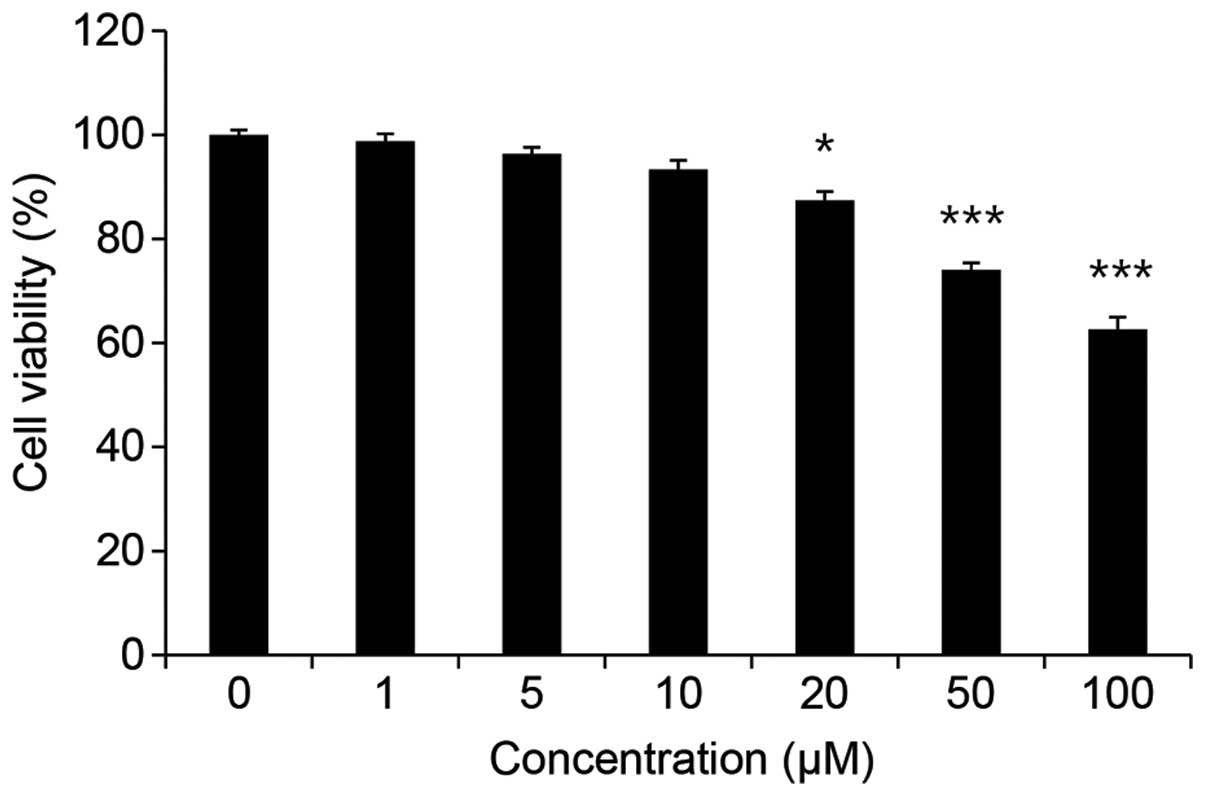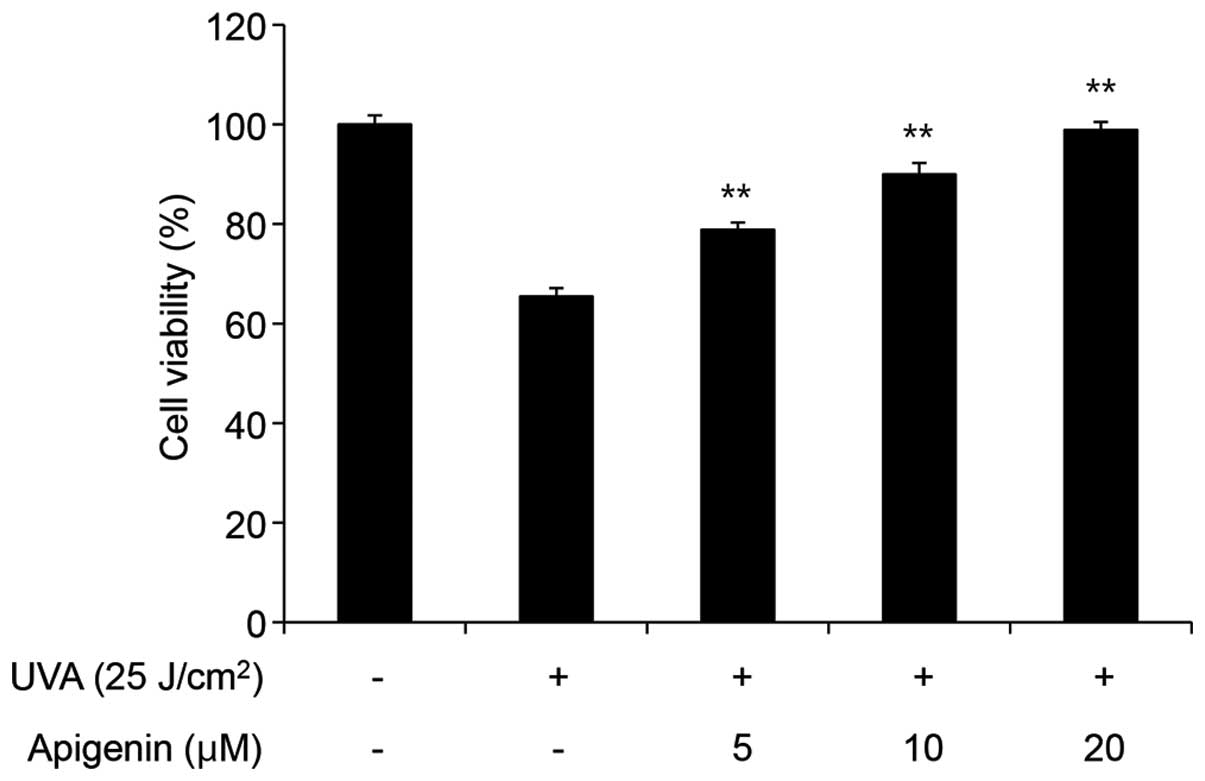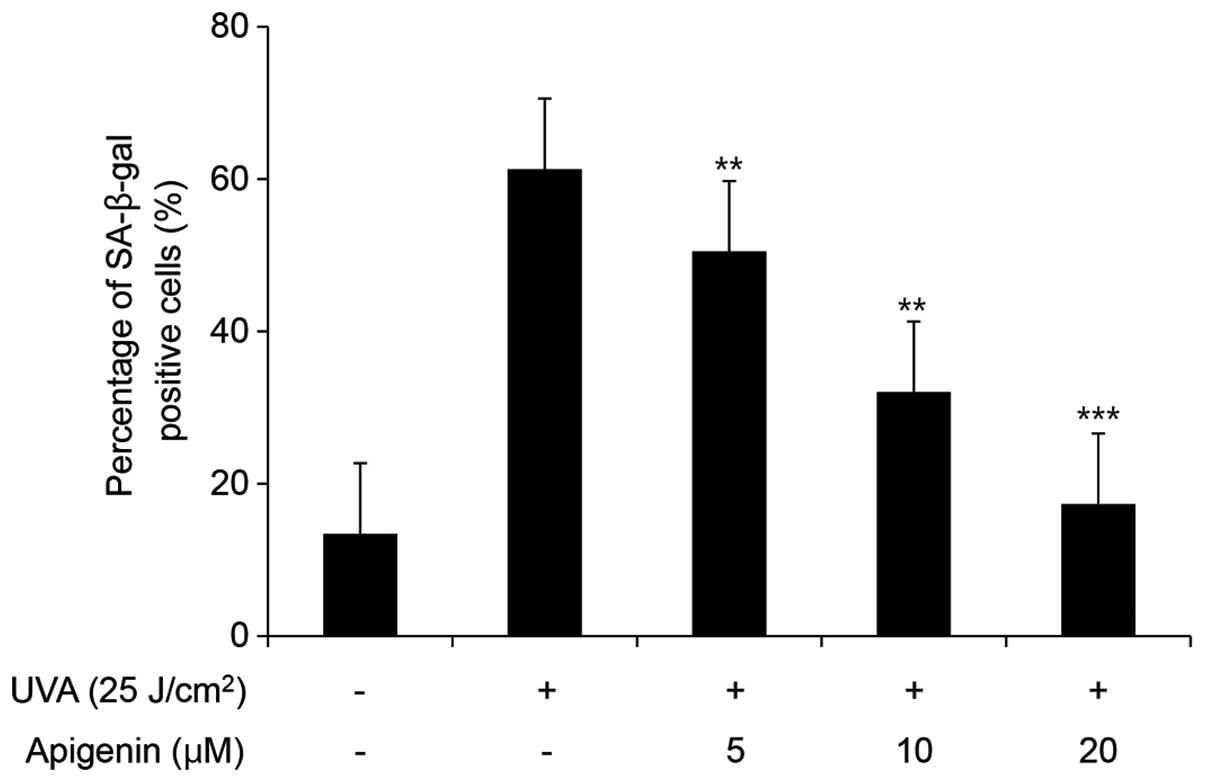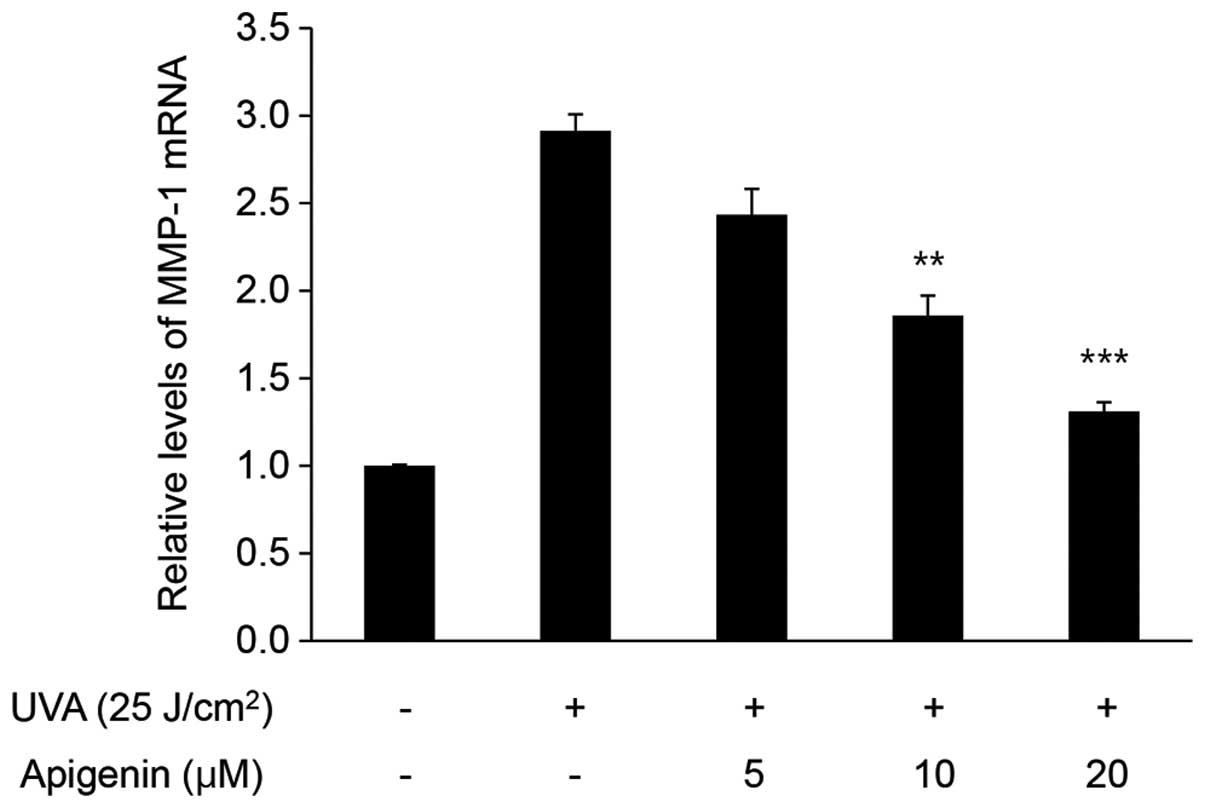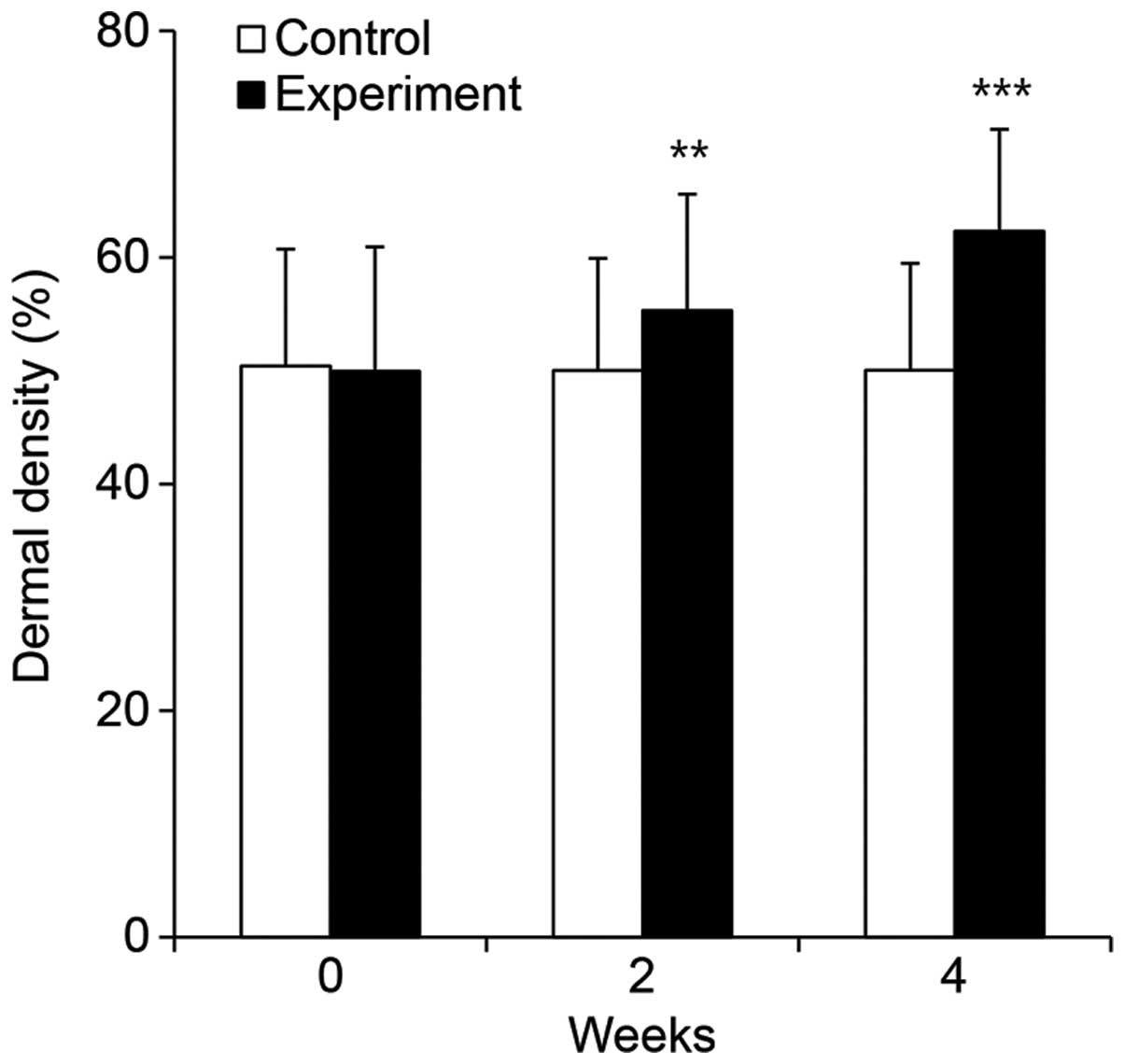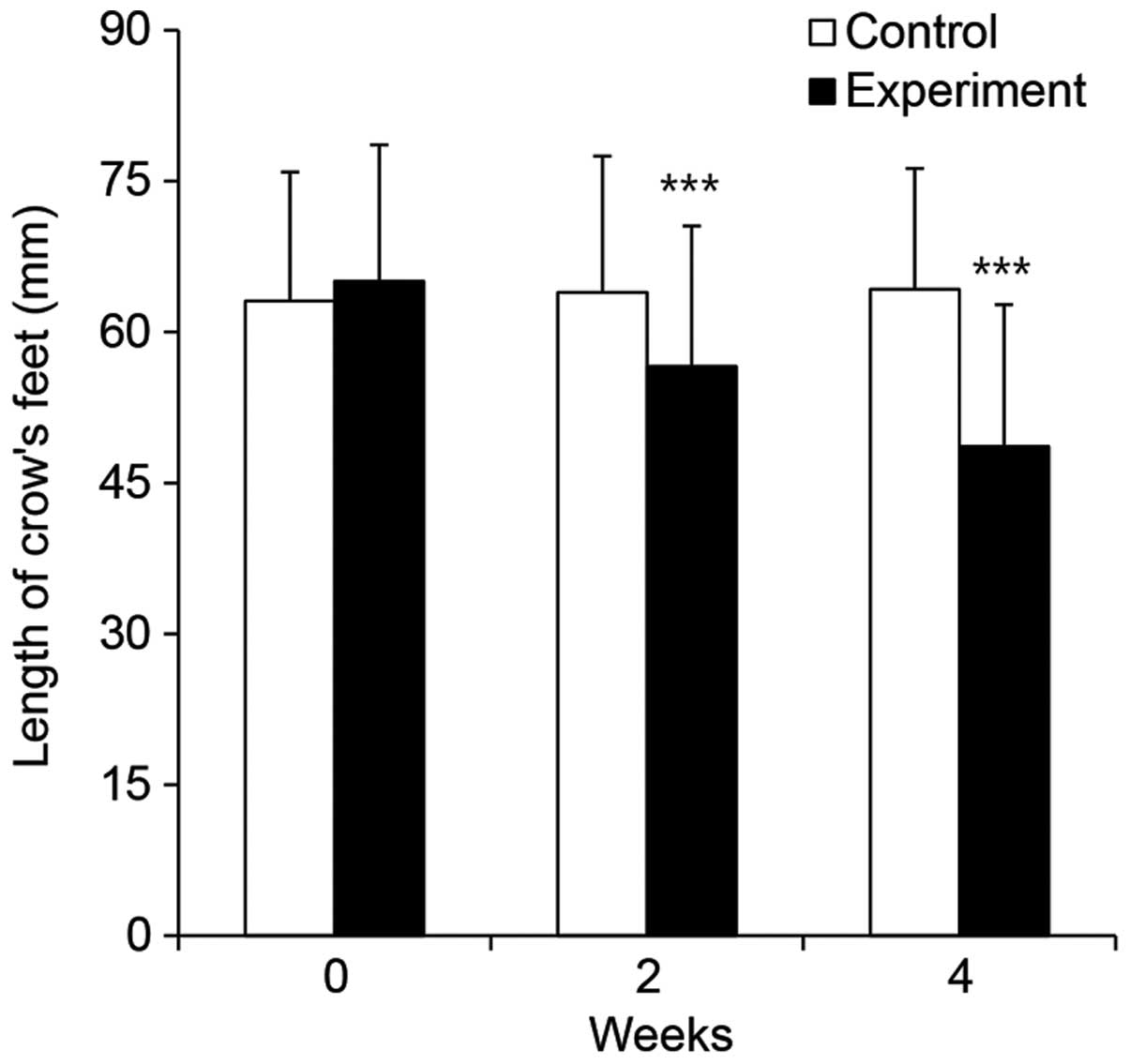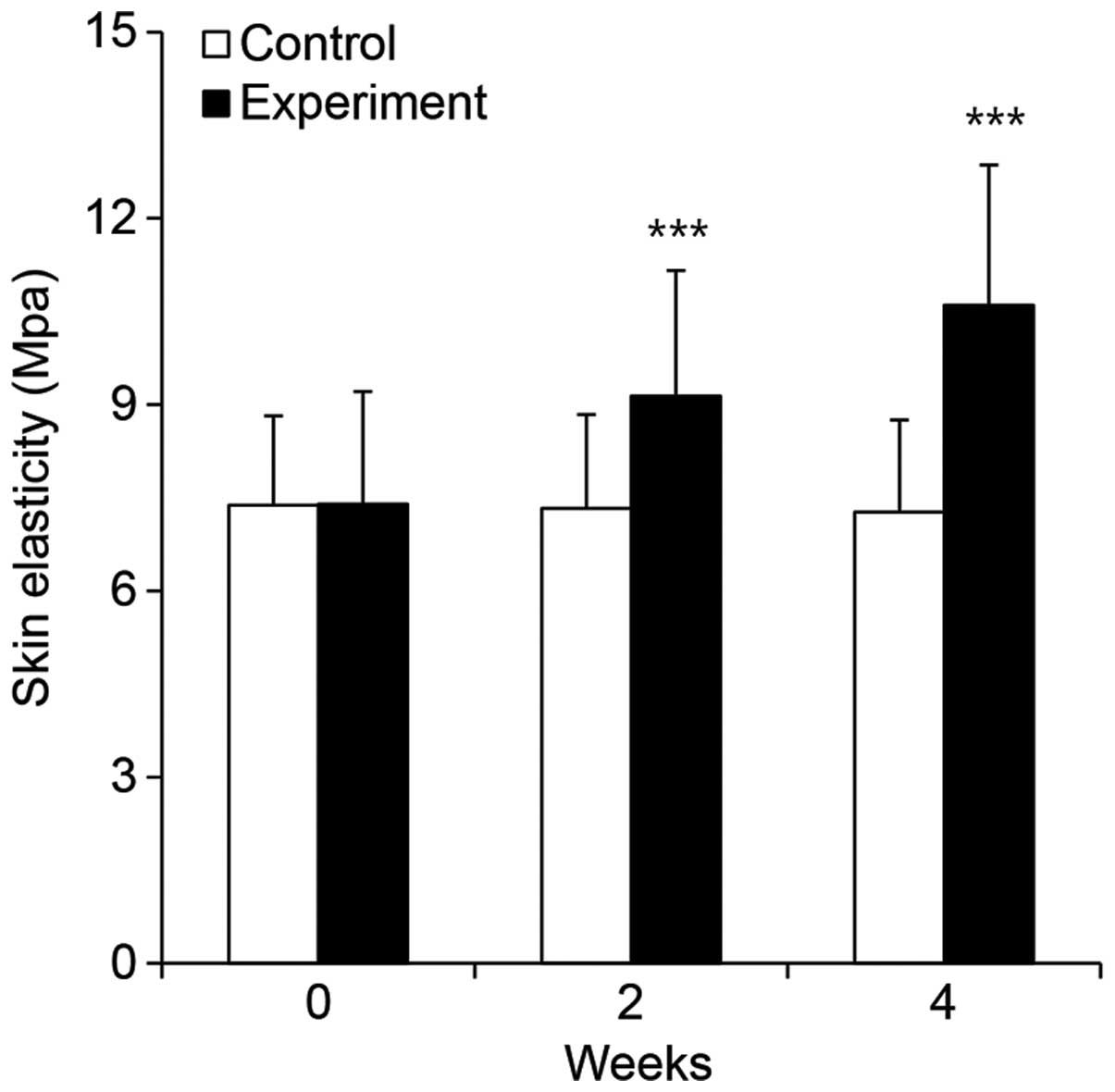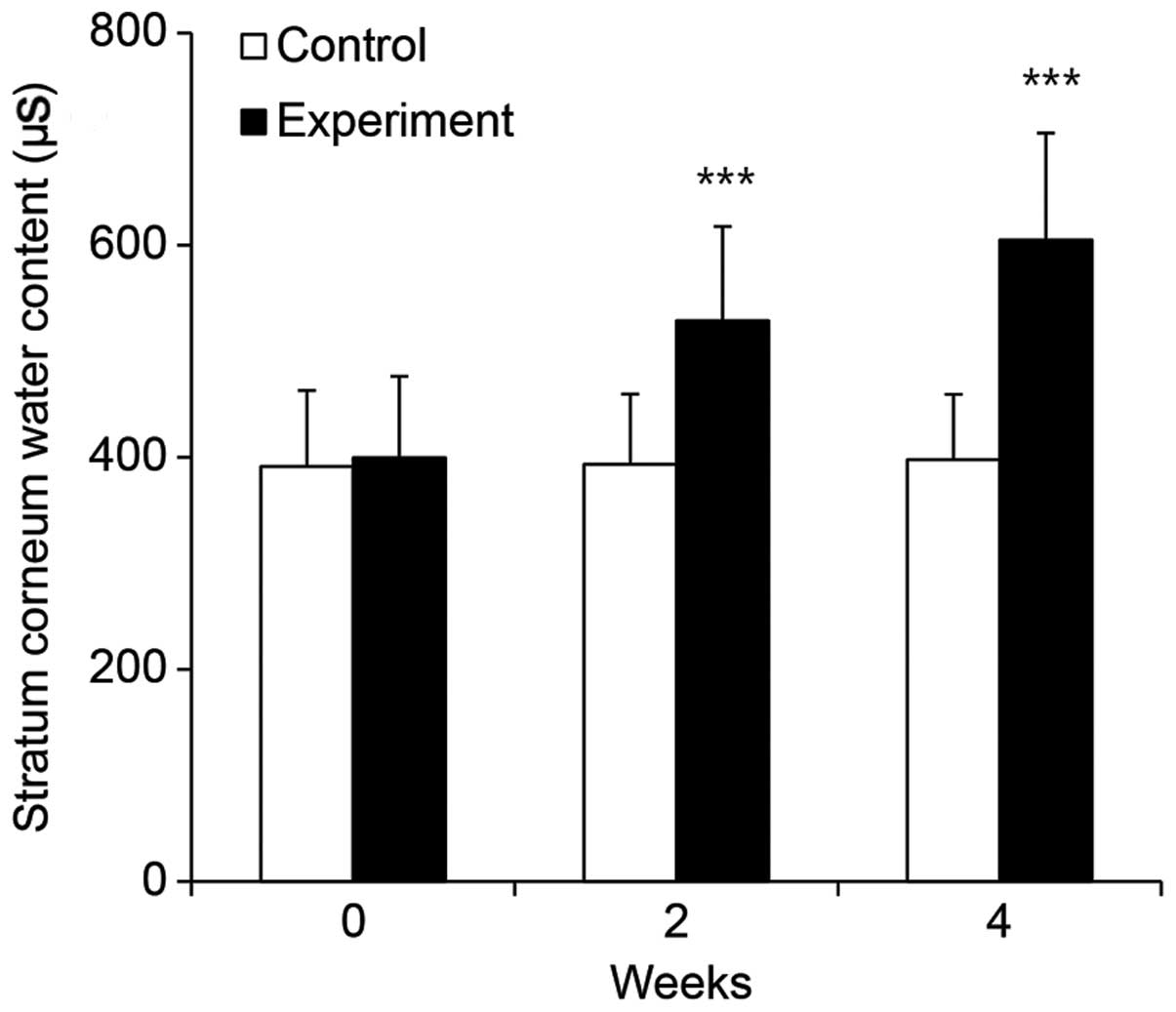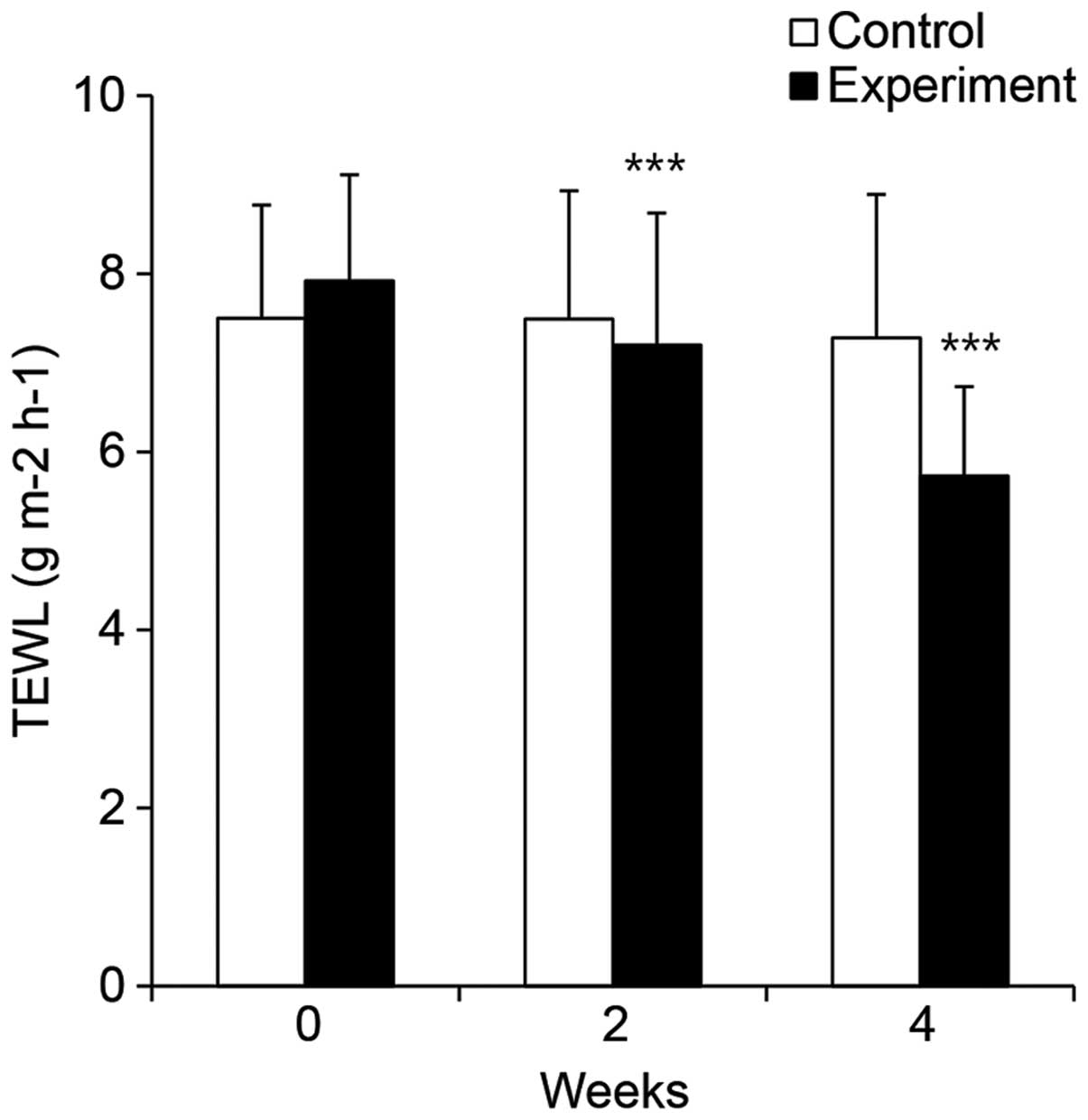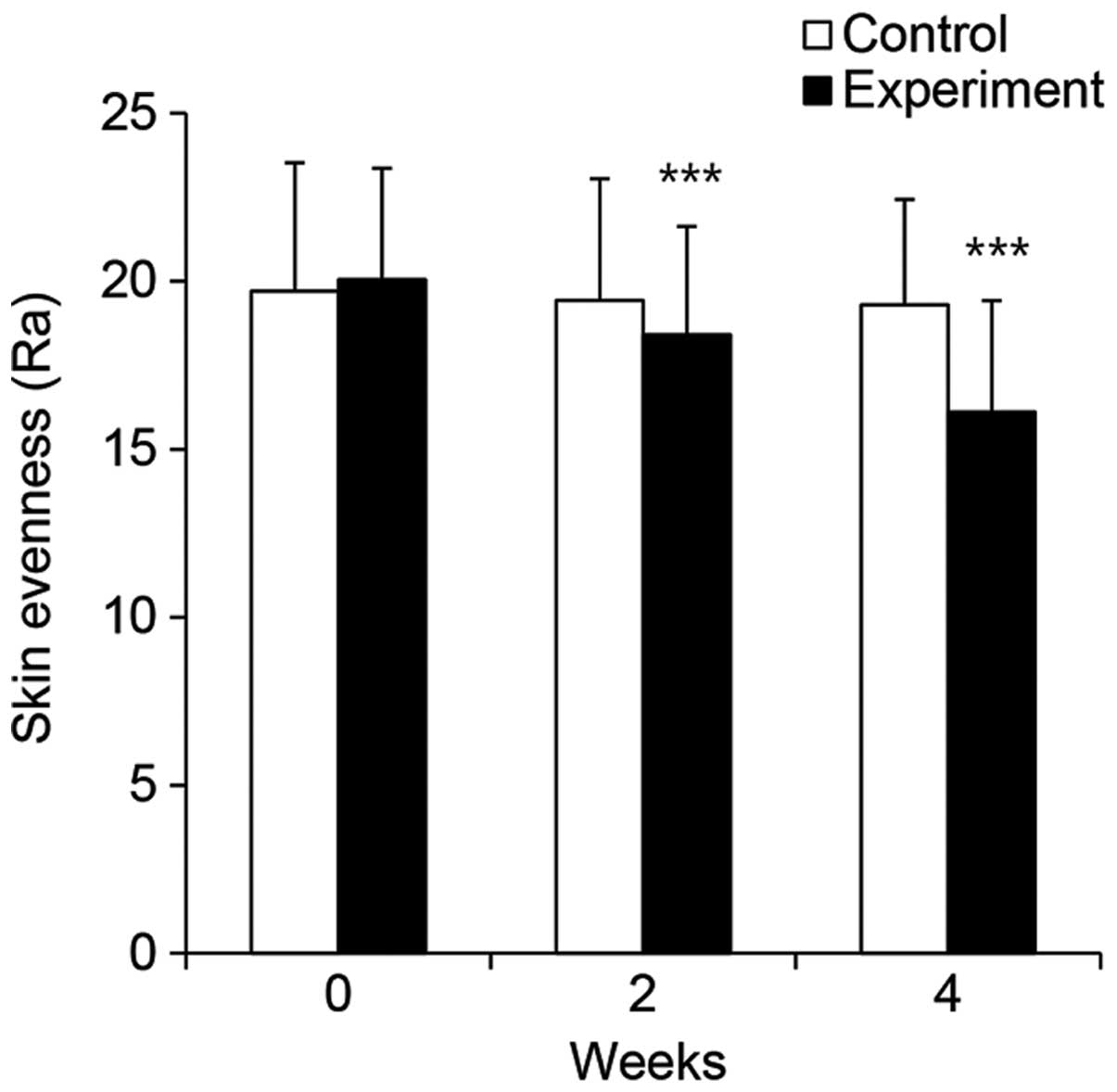|
1
|
Viña J, Borrás C and Miquel J: Theories of
ageing. IUBMB Life. 59:249–254. 2007. View Article : Google Scholar : PubMed/NCBI
|
|
2
|
Jenkins G: Molecular mechanisms of skin
ageing. Mech Ageing Dev. 123:801–810. 2002. View Article : Google Scholar : PubMed/NCBI
|
|
3
|
Zouboulis CC and Makrantonaki E: Clinical
aspects and molecular diagnostics of skin aging. Clin Dermatol.
29:3–14. 2011. View Article : Google Scholar
|
|
4
|
Hashizume H: Skin aging and dry skin. J
Dermatol. 31:603–609. 2004. View Article : Google Scholar : PubMed/NCBI
|
|
5
|
Farage MA, Miller KW, Elsner P and Maibach
HI: Intrinsic and extrinsic factors in skin ageing: a review. Int J
Cosmet Sci. 30:87–95. 2008. View Article : Google Scholar : PubMed/NCBI
|
|
6
|
Landau M: Exogenous factors in skin aging.
Curr Probl Dermatol. 35:1–13. 2007. View Article : Google Scholar : PubMed/NCBI
|
|
7
|
Elsner P, Fluhr JW, Gehring W, Kerscher
MJ, Krutmann J, Lademann J, Makrantonaki E, Wilhelm KP and
Zouboulis CC: Anti-aging data and support claims - consensus
statement. J Dtsch Dermatol Ges. 9(Suppl 3): S1–32. 2011.
View Article : Google Scholar
|
|
8
|
Sharma H, Kanwal R, Bhaskaran N and Gupta
S: Plant flavone apigenin binds to nucleic acid bases and reduces
oxidative DNA damage in prostate epithelial cells. PLoS One.
9:e915882014. View Article : Google Scholar : PubMed/NCBI
|
|
9
|
Wang J, Liu YT, Xiao L, Zhu L, Wang Q and
Yan T: Anti-inflammatory effects of apigenin in
lipopolysac-charide-induced inflammatory in acute lung injury by
suppressing COX-2 and NF-kB pathway. Inflammation. 37:2085–2090.
2014. View Article : Google Scholar : PubMed/NCBI
|
|
10
|
Polier G, Giaisi M, Köhler R, Müller WW,
Lutz C, Buss EC, Krammer PH and Li-Weber M: Targeting CDK9 by
wogonin and related natural flavones potentiates the anti-cancer
efficacy of the Bcl-2 family inhibitor ABT-263. Int J Cancer.
136:688–698. 2015.
|
|
11
|
Taupin P: Apigenin and related compounds
stimulate adult neurogenesis. Mars, Inc., the Salk Institute for
Biological Studies: WO2008147483. Expert Opin Ther Pat. 19:523–527.
2009. View Article : Google Scholar : PubMed/NCBI
|
|
12
|
Lodhi S and Singhai AK: Wound healing
effect of flavonoid rich fraction and luteolin isolated from
Martynia annua Linn. on streptozotocin induced diabetic rats. Asian
Pac J Trop Med. 6:253–259. 2013. View Article : Google Scholar : PubMed/NCBI
|
|
13
|
Singer AJ and Clark RA: Cutaneous wound
healing. N Engl J Med. 341:738–746. 1999. View Article : Google Scholar : PubMed/NCBI
|
|
14
|
Gonzaga ER: Role of UV light in
photodamage, skin aging, and skin cancer: importance of
photoprotection. Am J Clin Dermatol. 10(Suppl 1): 19–24. 2009.
View Article : Google Scholar : PubMed/NCBI
|
|
15
|
Ham SA, Kang ES, Lee H, Hwang JS, Yoo T,
Paek KS, Park C, Kim JH, Lim DS and Seo HG: PPARδ inhibits
UVB-induced secretion of MMP-1 through MKP-7-mediated suppression
of JNK signaling. J Invest Dermatol. 133:2593–2600. 2013.
View Article : Google Scholar : PubMed/NCBI
|
|
16
|
Lee YK, Cha HJ, Hong M, Yoon Y, Lee H and
An S: Role of NF-κB-p53 crosstalk in ultraviolet A-induced cell
death and G1 arrest in human dermal fibroblasts. Arch Dermatol Res.
304:73–79. 2012. View Article : Google Scholar
|
|
17
|
Mac-Mary S, Sainthillier JM, Jeudy A,
Sladen C, Williams C, Bell M and Humbert P: Assessment of
cumulative exposure to UVA through the study of asymmetrical facial
skin aging. Clin Interv Aging. 5:277–284. 2010.PubMed/NCBI
|
|
18
|
Smith JG Jr, Davidson EA, Sams WM Jr and
Clark RD: Alterations in human dermal connective tissue with age
and chronic sun damage. J Invest Dermatol. 39:347–350. 1962.
View Article : Google Scholar : PubMed/NCBI
|
|
19
|
Grewe M, Trefzer U, Ballhorn A, Gyufko K,
Henninger H and Krutmann J: Analysis of the mechanism of
ultraviolet (UV) B radiation-induced prostaglandin E2 synthesis by
human epidermoid carcinoma cells. J Invest Dermatol. 101:528–531.
1993. View Article : Google Scholar : PubMed/NCBI
|
|
20
|
Chung JH, Seo JY, Choi HR, Lee MK, Youn
CS, Rhie G, Cho KH, Kim KH, Park KC and Eun HC: Modulation of skin
collagen metabolism in aged and photoaged human skin in vivo. J
Invest Dermatol. 117:1218–1224. 2001. View Article : Google Scholar : PubMed/NCBI
|
|
21
|
Inomata S, Matsunaga Y, Amano S, Takada K,
Kobayashi K, Tsunenaga M, Nishiyama T, Kohno Y and Fukuda M:
Possible involvement of gelatinases in basement membrane damage and
wrinkle formation in chronically ultraviolet B-exposed hairless
mouse. J Invest Dermatol. 120:128–134. 2003. View Article : Google Scholar : PubMed/NCBI
|
|
22
|
Fisher GJ, Datta SC, Talwar HS, Wang ZQ,
Varani J, Kang S and Voorhees JJ: Molecular basis of sun-induced
premature skin ageing and retinoid antagonism. Nature. 379:335–339.
1996. View
Article : Google Scholar : PubMed/NCBI
|
|
23
|
Fisher GJ, Wang ZQ, Datta SC, Varani J,
Kang S and Voorhees JJ: Pathophysiology of premature skin aging
induced by ultraviolet light. N Engl J Med. 337:1419–1428. 1997.
View Article : Google Scholar : PubMed/NCBI
|
|
24
|
Fisher GJ, Talwar HS, Lin J, Lin P,
McPhillips F, Wang Z, Li X, Wan Y, Kang S and Voorhees JJ: Retinoic
acid inhibits induction of c-Jun protein by ultraviolet radiation
that occurs subsequent to activation of mitogen-activated protein
kinase pathways in human skin in vivo. J Clin Invest.
101:1432–1440. 1998. View Article : Google Scholar : PubMed/NCBI
|
|
25
|
Livak KJ and Schmittgen TD: Analysis of
relative gene expression data using real-time quantitative PCR and
the 2(-Delta Delta C(T)) Method. Methods. 25:402–408. 2001.
View Article : Google Scholar
|
|
26
|
Nichols JA and Katiyar SK: Skin
photoprotection by natural polyphenols: Anti-inflammatory,
antioxidant and DNA repair mechanisms. Arch Dermatol Res.
302:71–83. 2010. View Article : Google Scholar
|
|
27
|
Pandel R, Poljšak B, Godic A and Dahmane
R: Skin photoaging and the role of antioxidants in its prevention.
ISRN Dermatol. 930164:20132013.
|
|
28
|
Tedesco AC, Martínez L and González S:
Photochemistry and photobiology of actinic erythema: Defensive and
reparative cutaneous mechanisms. Braz J Med Biol Res. 30:561–575.
1997. View Article : Google Scholar : PubMed/NCBI
|
|
29
|
Scharffetter K, Wlaschek M, Hogg A, Bolsen
K, Schothorst A, Goerz G, Krieg T and Plewig G: UVA irradiation
induces collagenase in human dermal fibroblasts in vitro and in
vivo. Arch Dermatol Res. 283:506–511. 1991. View Article : Google Scholar : PubMed/NCBI
|
|
30
|
Chung JH, Seo JY, Lee MK, Eun HC, Lee JH,
Kang S, Fisher GJ and Voorhees JJ: Ultraviolet modulation of human
macrophage metalloelastase in human skin in vivo. J Invest
Dermatol. 119:507–512. 2002. View Article : Google Scholar : PubMed/NCBI
|
|
31
|
Burke EM, Horton WE, Pearson JD, Crow MT
and Martin GR: Altered transcriptional regulation of human
interstitial collagenase in cultured skin fibroblasts from older
donors. Exp Gerontol. 29:37–53. 1994. View Article : Google Scholar : PubMed/NCBI
|
|
32
|
Vincenti MP, White LA, Schroen DJ, Benbow
U and Brinckerhoff CE: Regulating expression of the gene for matrix
metalloproteinase-1 (collagenase): mechanisms that control enzyme
activity, transcription, and mRNA stability. Crit Rev Eukaryot Gene
Expr. 6:391–411. 1996. View Article : Google Scholar : PubMed/NCBI
|
|
33
|
Lim JY, Kim OK, Lee J, Lee MJ, Kang N and
Hwang JK: Protective effect of the standardized green tea seed
extract on UVB-induced skin photoaging in hairless mice. Nutr Res
Pract. 8:398–403. 2014. View Article : Google Scholar : PubMed/NCBI
|
|
34
|
Kimura Y and Sumiyoshi M: Olive leaf
extract and its main component oleuropein prevent chronic
ultraviolet B radiation-induced skin damage and carcinogenesis in
hairless mice. J Nutr. 139:2079–2086. 2009. View Article : Google Scholar : PubMed/NCBI
|
|
35
|
Tagami H, Ohi M, Iwatsuki K, Kanamaru Y,
Yamada M and Ichijo B: Evaluation of the skin surface hydration in
vivo by electrical measurement. J Invest Dermatol. 75:500–507.
1980. View Article : Google Scholar : PubMed/NCBI
|
|
36
|
Singh JP, Selvendiran K, Banu SM,
Padmavathi R and Sakthisekaran D: Protective role of Apigenin on
the status of lipid peroxidation and antioxidant defense against
hepatocarcinogenesis in Wistar albino rats. Phytomedicine.
11:309–314. 2004. View Article : Google Scholar : PubMed/NCBI
|
|
37
|
Ha SK, Lee P, Park JA, Oh HR, Lee SY, Park
JH, Lee EH, Ryu JH, Lee KR and Kim SY: Apigenin inhibits the
production of NO and PGE2 in microglia and inhibits neuronal cell
death in a middle cerebral artery occlusion-induced focal ischemia
mice model. Neurochem Int. 52:878–886. 2008. View Article : Google Scholar
|
|
38
|
Myhrstad MC, Carlsen H, Nordström O,
Blomhoff R and Moskaug JØ: Flavonoids increase the intracellular
glutathione level by transactivation of the gamma-glutamylcysteine
synthetase catalytical subunit promoter. Free Radic Biol Med.
32:386–393. 2002. View Article : Google Scholar : PubMed/NCBI
|
|
39
|
Wei H, Tye L, Bresnick E and Birt DF:
Inhibitory effect of apigenin, a plant flavonoid, on epidermal
ornithine decarboxylase and skin tumor promotion in mice. Cancer
Res. 50:499–502. 1990.PubMed/NCBI
|
|
40
|
Fligiel SE, Varani J, Datta SC, Kang S,
Fisher GJ and Voorhees JJ: Collagen degradation in
aged/photodamaged skin in vivo and after exposure to matrix
metalloproteinase-1 in vitro. J Invest Dermatol. 120:842–848. 2003.
View Article : Google Scholar : PubMed/NCBI
|
|
41
|
Chu ML and Prockop D: Collagen: gene
structure. Connective Tissue and Its Heritable Disorders. 2nd
edition. Wiley-Liss, Inc; New York, NY: pp. 149–165. 1993
|
|
42
|
Lim SH, Kim SM, Lee YW, Ahn KJ and Choe
YB: Change of biophysical properties of the skin caused by
ultraviolet radiation-induced photodamage in Koreans. Skin Res
Technol. 14:93–102. 2008.PubMed/NCBI
|















